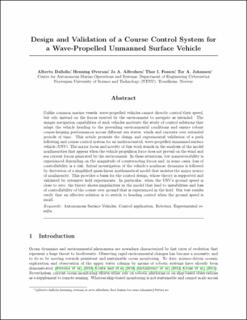Design and Validation of a Course Control System for a Wave-Propelled Unmanned Surface Vehicle
Journal article
Accepted version

Åpne
Permanent lenke
https://hdl.handle.net/11250/3017881Utgivelsesdato
2022Metadata
Vis full innførselSamlinger
Originalversjon
10.55417/fr.2022025Sammendrag
Unlike common marine vessels, wave-propelled vehicles cannot directly control their speed, but rely instead on the forces exerted by the environment to navigate as intended. The unique navigation capabilities of such vehicles motivate the study of control solutions that adapt the vehicle heading to the prevailing environmental conditions and ensure robust course-keeping performances across different sea states, winds, and currents over extended periods of time. This article presents the design and experimental validation of a path following and course control system for an underactuated, wave-propelled unmanned surface vehicle (USV). The major focus and novelty of this work stands in the analysis of the model nonlinearities that appear when the vehicle propulsion force does not prevail on the wind and sea current forces generated by the environment. In these situations, low maneuverability is experienced depending on the magnitude of counteracting forces and, in some cases, loss of controllability is a risk. Initial investigation of the vehicle’s nonlinear dynamics is followed by derivation of a simplified quasilinear mathematical model that isolates the major source of nonlinearity. This provides a basis for the control design, the theory of which is supported and validated by extensive field experiments. In particular, when the USV’s ground speed is close to zero, the theory shows singularities in the model that lead to instabilities and loss of controllability of the course over ground that is experienced in the field. Our test results verify that an effective solution is to switch to heading control when the ground speed is small.